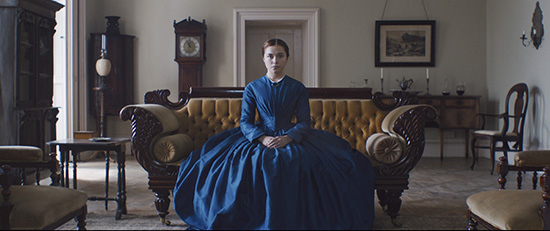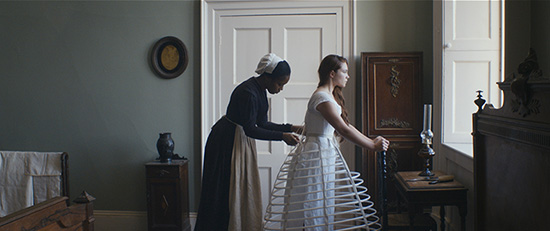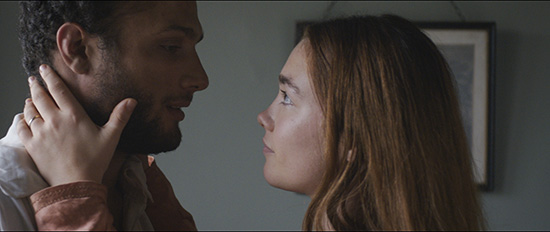Hell Hath No Fury Like a Woman Bored
The feature film debut by director William Oldroyd (with a screenplay by Alice Birch), Lady Macbeth is a stark, violent drama that takes place in a classically sedate setting: rural, 19th-century England. Based on the 1865 novella Lady Macbeth of the Mtensk District, by Nikolai Leskov, Oldroyd’s film stars Florence Pugh as Katherine, a young bride who claws her way out of a stifling marriage with a cold, much older husband. The young actress (19 at the time this was filmed) is riveting in a role that demands tremendous effort, physically and emotionally.
We first see Katherine at her wedding, wet-eyed and frightened under her veil; that night her glowering husband Alexander (Paul Hilton, darkly Dickensian) orders her to take off her nightgown, then doesn’t touch her. It’s clear this is a loveless, almost perverse match. Expected to stay indoors and play dutiful wife and daughter-in-law, respectively, to Alexander and his even chillier father Boris (Christopher Fairbank), the teen is clearly bored out of her mind, nodding off at dinner and napping constantly. Whatever hopes she may have had for this marriage, they sure aren’t being fulfilled. A resentful maid, Anna (Naomi Ackie), seemingly in thrall to “the master,” roughly brushes Katherine’s hair and yanks tight her corset, adding to the latter’s general discomfort.
When Alexander and Boris have to leave town, Katherine escapes the dull house to walk out on the moors and the film’s mood changes drastically, becoming alive. An outdoorsy type, she is energized. Then, in a Lady Chatterley-like plot turn, she comes upon cheeky new groomsman Sebastian (Cosmo Jarvis), who, along with some other workers, is engaging in some highly questionable hijinx with Anna. Katherine tries to be imperious, but winds up flirting brazenly with him. They embark on a crazed, lust-driven affair, which seems to release something wild in a girl who has already shown that she has a mind of her own.
Boris returns to the house and a newly rebellious Katherine, who is clearly drunk at dinner. When he discovers that his favorite wine is missing, Anna is punished and humiliated. He also slaps Katherine for her insolence, but she’s steely and imperturbable. It’s a war of wills that Katherine soon wins in a brutal, darkly funny manner. The more Katherine rebels and triumphs, the more distraught Anna becomes. At one point the maid is so traumatized she stops speaking.
Katherine flaunts her affair with Sebastian in front of Anna and the rest of the staff. When Alexander returns, he takes his time before confronting his wife about her indiscretions, which are apparently the talk of the town, a source of great embarrassment to him. In response to Alexander’s cruel words, she spitefully initiates sex with Sebastian right in front of him. This results in a scuffle between the two men, which Katherine ends in viciously violent fashion, shocking even Sebastian. Charlotte Brontë, this isn’t. Katherine is one ruthless heroine.
Sebastian is sickened and haunted by Katherine’s actions, as are we. But she’s not done yet. When an older woman, Agnes, shows up with a young boy she claims is Alexander’s ward (from a previous liaison with her deceased daughter), Katherine at first becomes attached to the adorable Teddy, until Sebastian expresses jealousy. Here’s where the film becomes truly unsettling, as we realize that its heroine has become completely (if coolly) unhinged by obsessive love/lust.
Lady Macbeth is an audacious movie, one that’s all the more outrageous for its staid setting and deliberate pacing. There’s also a interestingly contemporary, biracial aspect (which is never really addressed), with Anna, Agnes, and Teddy all played by Black actors. Though at times almost comically over-the-top in its brutality, the film is a streamlined, beautifully presented piece, unburdened by extraneous dialogue or scenes. It’s costume drama as lean, mean killing machine.
Lady Macbeth opens in theaters on Friday, July 14.
—Marina Zogbi




